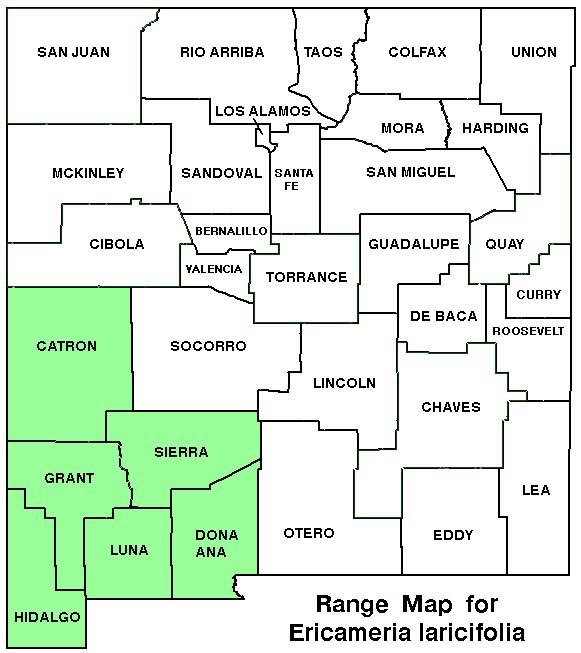WILDFLOWERS OF NEW MEXICO

Clusters of small but showy yellow flowers cover this densely branching, 3-foot tall and wide bush, followed by tan blanket of fluffy seed heads. Note the resinous odor of the dark-green, narrow leaves.
FLOWER: April–October. Flower heads on short stems (peduncles), to 5/8-inch long (15 mm), form dense arrays; each flower head has 3–6 yellow ray flowers, each 3/16-inch long (5 mm), surrounding a yellow disk with 6–16 tiny, tubular florets. Seeds are surrounded by a dense tuft of tan to off-white bristly hairs.
LEAVES: Alternate. Blades narrow, 3/8–3/4 inch long (10–20 mm), 1/16-inch wide (2 mm); surfaces deep green, dotted with resinous, glands, hairless.
HABITAT: Dry sandy, rocky soils, slopes, canyons, hills, desert mountains; desert scrub, pinyon-juniper-oak woodlands.
ELEVATION: 4,000–7,200 feet.
RANGE: AZ, CA, NM, TX.
SIMILAR SPECIES: The sub-shrub Damianita, Chrysactinia mexicana, in much the same range, reaches 20-inches tall and wide.
NM COUNTIES: NW fourth of NM in low- to mid-elevation habitats: Catron, Dona Ana, Grant, Hidalgo, Luna, Sierra.









TURPENTINE BUSH
ERICAMERIA LARICIFOLIA
Aster Family, Asteraceae
Perennial, evergreen shrub









THE CONTENTS OF THIS WEBSITE ARE COPYRIGHTED AND CANNOT BE USED
WITHOUT PERMISSION OF GEORGE OXFORD MILLER





















































Turpentine Bush in flower (above); in seed (below).
With dark-green foliage and an abundance of yellow flowers, Turpentine Bush is a popular drought-tolerant landscape plant.

















EMAIL ME







